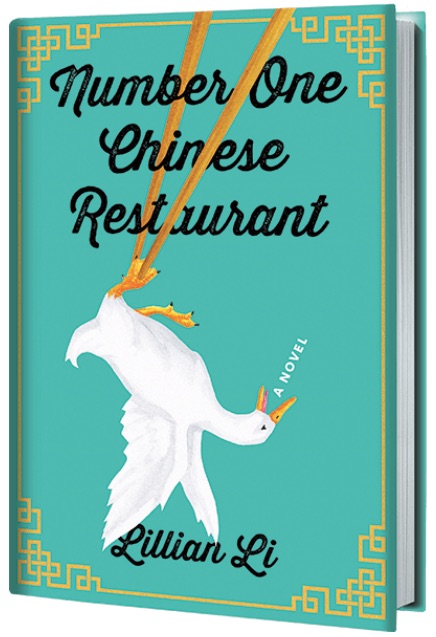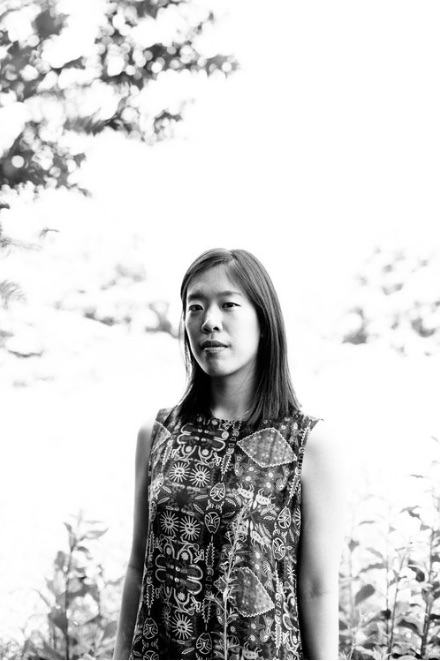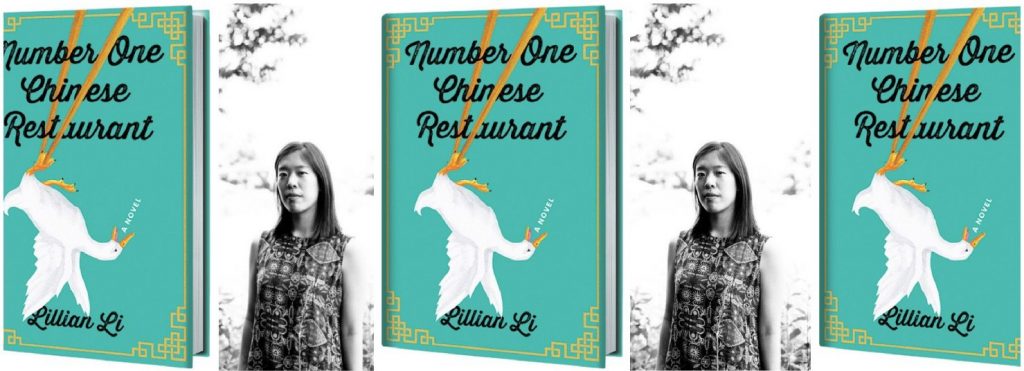When I asked Lillian Li about her experience working at a Chinese restaurant, she told me about a co-worker of hers once commenting that working at a restaurant meant having a cage over your heart. This sentiment is so utterly, achingly true of the characters in her debut novel, Number One Chinese Restaurant (Henry Holt, 2018), whose hearts seem to rattle around their cages with fury and longing and unbridled ambition. Number One Chinese Restaurant follows three generations of employees at the family-owned Beijing Duck House, maintaining a precarious level of controlled chaos both at work and in their lives.
Among the many characters it follows, there is the prickly and ambitious Jimmy Han, who is attempting to sell the restaurant he and his brother Johnny inherited from their deceased father in order to purchase a more upscale venue. While Johnny wishes to maintain his father’s vision for the restaurant, the Duck House is both an enemy and an effigy for Jimmy, who is desperate to rid himself of his family’s influence.  So Jimmy enlists the help of Uncle Pang, a shrewd and intimidating man with a missing finger who played a vital role in bringing the Han family to the United States and establishing the Duck House. Among turns equally gutting and hilarious, the hapless plan to abandon the Duck House — and with it, his father’s dream — tears through the lives of the restaurant’s employees.
So Jimmy enlists the help of Uncle Pang, a shrewd and intimidating man with a missing finger who played a vital role in bringing the Han family to the United States and establishing the Duck House. Among turns equally gutting and hilarious, the hapless plan to abandon the Duck House — and with it, his father’s dream — tears through the lives of the restaurant’s employees.
One of the more poignant threads running through the novel is the relationship between Nan and Ah-Jack, two employees of the Duck House maintaining a comfortable but restrained friendship as a buffer for thirty years of romantic tension. Li renders Nan’s feelings with a gentle, subtle hand, writing of “the tender place she’d been ignoring and stood back, aghast but not surprised, to witness the crumbling edge of her reason. Her imagination began and ended with Ah-Jack.”
A stunning debut, Number One Chinese Restaurant is full of humor and pathos. Amidst Li’s tight and insightful prose are cutting ruminations on family, sacrifice, and the American dream. Its broad ensemble cast never feels crowded or caricatured, and even in unpacking her characters’ flaws and idiosyncrasies, Li never ridicules them or attempts to moralize, nor does she ever attempt to soften or deflect their errors. This is what allows Li to maintain that line between aching vulnerability and dark humor, and in this way, give us a story that is at its core utterly human.
I recently had the opportunity to chat with Li about her debut, rooting for unlikeable characters, and locating questions that take a few books to answer.
I’m going to start from square one here by asking when you knew this was a novel. As in, where did this story start and what about it made you feel you needed to tell it?
That’s a great first question, because it lets me give two different answers. The first is when I knew there was a story that I wanted to tell, which was on my last day waiting tables at this Chinese restaurant near my hometown. I’d only been a waiter for four weeks, and I’d been terrified and lonely the entire time. The other waiters were nice, but there was a language barrier. I could understand them almost perfectly, but I couldn’t really say more than your average Chinese toddler. But when they learned that I was quitting, they each individually congratulated me on getting out. A lot was said on that last day, which I’ll keep a private memory. But I’ll share this one thing, which was that one of the older waiters, who was in his seventies, told me that working in a restaurant meant having a cage over your heart. Those words stayed with me. They captured my brief experience perfectly (of working forced double shifts six days a week in a restaurant where the customers had no interest in your humanity), and also opened it up, and made me imagine my four weeks stretching into years, then decades.
Those words ended up obliterating the novel I had been working on (funnily enough, during the hour break between lunch and dinner service). Which leads me to my second answer, which was that though it destroyed any hopes of completing the first novel, originally I didn’t know if this experience was actually going to be a novel. I wrote it first as a short story, my first semester of grad school, to see if I felt comfortable in the space, in the heads and bodies of the people. I found that I was, and more importantly that I was balanced between knowing enough and wanting to know more.
“Working in a restaurant meant having a cage over your heart” — wow! That’s definitely something I felt a lot from the characters in this novel, this having to mute your personhood as an employee. Particularly in Ah-Jack and Nan, two older members of the Duck House’s waitstaff whose unusual relationship constitutes one of the main threads of the novel. For thirty years, these characters remain close to each other, and grapple with complex feelings for each other. Can you talk about how you conceived of the nature of this relationship?

First off, “mute your personhood” is such a perfect way of articulating what happens in that Chinese restaurant space. Part of what also drew me to the space was how it doubles down on that phenomenon. First, there’s the muting that naturally happens in a service position, and then, on top of that, the muting of being a “foreigner” in America, a demographic that isn’t always seen as possessing full personhood. I mean, we can even throw in a third, which is the literal muting of being forced to communicate in an unfamiliar language.
I think Nan and Ah-Jack’s relationship was the first that I came up with while writing the book. And I conceived of their relationship at the same time that I conceived of them. This is true, actually, for most, if not all of the characters in this book. I thought of relationships I wanted to explore in tandem with the characters who would create and fit into those relationships. I think this is why even though I scrapped the majority of the early pages I wrote, I didn’t scrap a single character. There’s not a character in the book that wasn’t in the earliest draft.
But to return to the question about how I conceived the nature of their relationship, I think it partly came from this lifelong interest in people who have known each other for a long time. These relationships always fascinated me because I saw how time provided an extra dimension to them, a different level of knowledge and comfort, but also strife and angst, that allowed these relationships to break all sorts of rules and boundaries. I was also thinking of the friendships that form between Chinese immigrants in America who, in their home country, would probably never have gotten along, let alone become friends, but in a frightening new place, they find comfort and kinship in someone who looks and sounds familiar, allowing them to push past the usual barriers to friendship.
So basically, I’m drawn to relationships that can’t be contained or described easily. I didn’t want Nan and Ah-Jack to be just unrequited lovers or just longtime work friends or just immigrants who found safety in each other. I wanted them to be all of the above and more, to fight definition, even at the risk of being misunderstood or mislabeled.
I love that your cast survived every incarnation of this novel. It’s quite an ensemble piece, and I don’t know really of any other writer I’ve spoken to that kept the cast consistent from draft one to final novel. Who would you say underwent the largest change between drafts? What contributed to that? Did you have anything about any character that was particularly difficult to part with?
On top of not having to cut any of my characters, I also have the double fortune of not having to dramatically alter their personalities from first draft to last. I think it’s because I spent the first months writing what were glorified character sketches. I thought I was writing the novel, but I was just having my characters move through their normal routines at the restaurant, and at home. I hadn’t realized yet that a novel tends to look at what happens when the normal routine is disrupted. Luckily, a professor taught me the difference, and I only had to throw out … two hundred pages or so. But those pages crystallized the characters for me. Most of the changes were actually turning down the volume on their personalities. So the main character, Jimmy, used to be way angrier. His brother, Johnny, even more sanctimonious. Their mother, more acerbic and unforgiving.
I did resist making Jimmy less of an unrepentant asshole. This isn’t much of a spoiler, but spoiler alert, in the third chapter, Jimmy drives drunk to his real estate agent’s house. I had a reader tell me that if one of the first things we’re learning about Jimmy is that he has no problem with drunk driving, that’s going to be a hard character to be sympathetic towards. But I didn’t care! I loved how awful he was. His tantrums delighted me. My editor finally had to tell me to be kinder to Jimmy, to show him some love. I realized I had been doing just that, but to excess. Because he was my favorite character, the one I loved the most, I was spoiling him, and letting him get away with everything. But I had to remember that to the reader, Jimmy is a stranger. And a stranger who is awful to his family, awful to his employees, and awful at his job is not someone you want to be around for very long.
I had to remember that ultimately, unlikeable characters are likable. In Lolita, for example, as much as I hate Humbert Humbert, I also enjoy his company — I find him abominable and disgusting, but he’s also charming, intelligent, and interesting to be around for the entire length of a novel. Jimmy could remain an asshole with an anger problem, but I also needed to make him someone you could root for.
I think that’s one of the wonderful things about rooting for unlikeable characters like Jimmy: the strange, sometimes baseless hope that if they get out from under their circumstances, they’ll become somehow better or redeemed. I think that’s just as powerful of a form of investment! And one of the most dually comic and tragic parts of this book is that this kind of hope for several characters is frequently subverted. How did you manage to find the humor in that without making this seem too much like a farce or an allegory/moral tale? And, conversely, how did you manage to avoid melodrama?
I’m happy to hear that you found a balance in comedy and tragedy in your reading. From the start I was interested in writing an immigrant/Chinese American narrative where the focus was on internal, rather than external obstacles. Essentially, I wanted to write characters that create many of their own problems. And when it’s mostly the characters’ own damn faults, it’s easier to avoid melodrama, or to use melodrama as a comic counterpoint. There’s great opportunity for comedy when a character acts out of hubris or spite because they practically write the script for their own downfall. A part of us enjoys seeing the other shoe drop.
At the same time, as you said so well, we also hope against hope for redemption in those kinds of stories. I think this happens when we recognize our own dysfunction in those dysfunctional characters, our own hubris and spite. We’re looking at their redemption as proof of our own. We end up wanting these characters to get what they deserve, while also wanting them to get better than they deserve. I realized I could achieve that ambivalence by basically writing human characters who get caught up in their own humanity, and that simple edict helped me walk the line.
Do you think the immigrant/Chinese American narrative is something you’ll explore in further work? And are you comfortable talking about what you’ve been working on since the completion of this novel?
I think often about what poet Ocean Vuong once said in an interview. The interviewer asked, essentially, if the writing he was currently working on was preoccupied with the same questions he’d explored in his first collection (Night Sky With Exit Wounds), or different ones, and Vuong’s answer was, “Well, they’re always growing, but there are the same foundational questions.”
I feel like that’s my mindset, as well, at least right now. Writing Number One Chinese Restaurant only scratched the surface of the foundational questions I’d had: What makes a community? What is a family worth? What does the American Dream really look like? Is there success without sacrifice and/or sin? In fact, each question has only sprouted more questions, like some nightmarishly flowering tree.
So, what I’m working on now feels like a natural extension and evolution of those questions. I’m looking at a group of childhood friends who grow up in a sheltered Chinese-American neighborhood in Maryland and who, at different points in their lives, leave that community. That’s all I have right now! Fingers crossed that I’ll have more later.
Find out more at lillianliauthor.com, or follow her on Twitter @ZillianZi.




